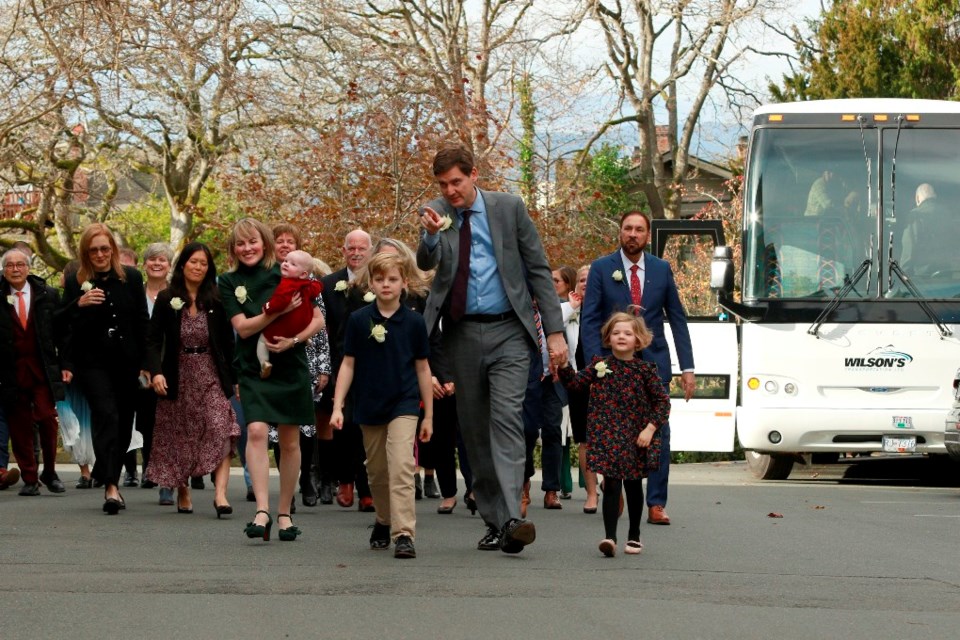Premier David Eby unveiled a far weaker cabinet Monday than the one he carried into last election. But with some smart ministry re-organizations, and careful use of his remaining power players, the premier has crafted himself a fighting chance to get some of his priority items in motion.
Eby vision for his new cabinet, focused on affordability, health care, public safety and the economy.
“They are not simple challenges,” he said. “And the commitment that I made on the stage of the speech today, as well here, is to do my best. Our team will do our best to bring all British Columbians along as we take on these serious challenges.”
First, the positives.
Eby is lucky to have strong frontbench ministers like Brenda Bailey and Josie Osborne, to put into the ministries of finance and health care respectively.
Bailey, a former Vancouver tech CEO who was previously jobs minister, said she’ll chart a plan back to a balanced budget, while also providing new cost-of-living help and executing the new $1,000 income tax rebate. This is a delicate, but critical, balance upon which the future of the NDP government hangs.
Osborne, who moves from energy, has to not only solve the ongoing health-care staffing crisis and ER closures, but also stickhandle involuntary care and new regional addictions treatment centres, after Eby folded the ministry of mental health and addictions back into the health portfolio.
That’s a lot, to put it mildly.
The premier’s decision to shuffle out long-time health minister Adrian Dix into the energy portfolio makes a lot of sense. It signals a change in direction in health care, after immense public frustration at ER wait times and closures — though Eby could not bring himself to admit this when asked Monday.
“We’ve made some good ground on those under Adrian; Josie is going to continue that critically important work,” said Eby, falling back on messaging that was stale when it debuted two months ago in the election.
Still, Dix was a formidable energy critic back in his opposition days. Plus, moving the CleanBC climate file from environment to energy gives Dix a clear runway to dramatically expand electrification capacity to hit ambitious climate goals.
Similarly, you could see Eby’s thinking in creating a new infrastructure ministry to try and accelerate the construction of new schools and hospitals — an area the New Democrats were criticized in the election campaign.
Eby gave the portfolio to Bowinn Ma, an engineer and former project manager. And he suggested she begin looking at standardized school designs, to get classrooms built more quickly. It would have been great to do that in 2017, after the NDP promised to eliminate school portables in Surrey with a blitz of new construction — but, better late than never.
Housing Minister Ravi Kahlon retained his portfolio but with an important tweak: He now has responsibility for municipal affairs too. The move is significant, because it gives Kahlon more power to not only push municipalities to change housing development policies, but then follow that through with cabinet orders for those that don’t comply.
If anyone thought the premier was backing down from things like quad-plexes on single family lots, short-term rental restrictions and mandatory transit density — think again. He’s now given Kahlon both the carrot and the stick to carry those through.
“The connection between our ability to deliver housing and the rules that municipalities have to work under has never been clearer,” said Eby.
And yet, not everything made sense.
A new ministry of mining and critical resources could leverage B.C.’s deposit of minerals needed for things like solar panels and batteries, and boost the economy with new mining projects — but giving it to urban Surrey MLA Jagrup Brar instead of a rural MLA, where mines are actually located, is odd.
Citizens’ Services Minister George Chow, who went completely missing in action during the government’s serious cyber security breach earlier this year, somehow got his portfolio back.
And it remains to be seen if Garry Begg, long since retired from the RCMP, is a better choice to solve the growing street disorder problems as solicitor general than Terry Yung, who worked in the Vancouver Police Department as recently as this year and has modern experience in areas like the Downtown Eastside.
Plus, at 27 ministers, 14 parliamentary secretaries, and a bunch of caucus positions — pretty much the entire 46-person NDP caucus under Eby got a fancy title, cushy job and extra pay on the taxpayer dime — which, during an affordability crisis, is gross.
“This isn't just government expansion; it's a blatant misuse of taxpayer dollars — more salaries, administrative costs and increased public funds being diverted from essential services,” Opposition Conservative Leader John Rustad posted on social media.
Still, as cabinets go, for a premier who came close to losing an election last month, this is about as good as you can get. Eby did the best with what he had. Now, his cabinet has to deliver.
Rob Shaw has spent more than 16 years covering B.C. politics, now reporting for CHEK 撸奶社区 and writing for Glacier Media. He is the co-author of the national bestselling book A Matter of Confidence, host of the weekly podcast Political Capital, and a regular guest on CBC Radio.





